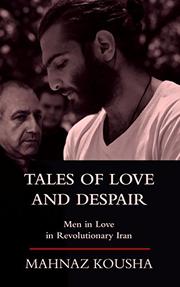


TALES OF LOVE AND DESPAIR
Men in Love in Revolutionary Iran
by Mahnaz Kousha
Based on her interviews with men who lived through the Iranian Revolution, the author delivers eight short stories that examine the human condition.
Moving freely between past and present, these narratives pit the romantic idealism of youth against the sobering reality of growing up, growing old, and growing apart. In “The Paris of the Middle East,” Nader Moradi and Mahta are young visionaries whose attempt to emulate the bohemian lifestyle of the European luminaries they so admire is thwarted by societal pressures to conform. Five years later, she lies in a hospital bed as he berates her for birthing a child he never wanted. Similarly, “Where Are We? We Are Here.” presents an unhappy marriage between Ali and Mariam, former political prisoners whose union was predicated on love notes and imagined similarities: “They had exchanged only momentary glances....Only short letters written in ink. And ink has its own enemies—air, water, time. It has an evaporating quality, just like love.” In “Errand Boy,” Hamid falls for Raha, a wealthy girl who frequents the yarn shop where he works, pursues her a bit too earnestly, and must settle for an arranged marriage after her family sends her away to escape his advances. These men are casualties of the times they live in, denied happiness for the sake of survival. So, too, is Iran itself. These engrossing tales with strongly drawn characters are also about a country halted in its tracks, an era of budding equality and freedom in the 1970s that gave way to years of shortages, rampant incarceration, paranoia, and morality police during the revolution. Even afterward, there are ex-soldiers broken by war, families torn apart by emigration, and residents challenged by a lingering sense of loyalty to the country that betrayed them. As Kousha (Voices from Iran, 2002) deftly observes: “They carried the unbearable weight of loss—loss of hope.” They also shoulder sacrifice, devotion, passion, shame, and regret. From “Father,” a brief glimpse of a husband tenderly caring for his wife after she miscarries, to “Second Marriage,” in which the protagonist grapples with the loss of his childhood sweetheart in an earthquake, these evocative stories artfully explore every facet of humanity.
An impressive collection about relationships in a turbulent Iran that offers powerful insights.